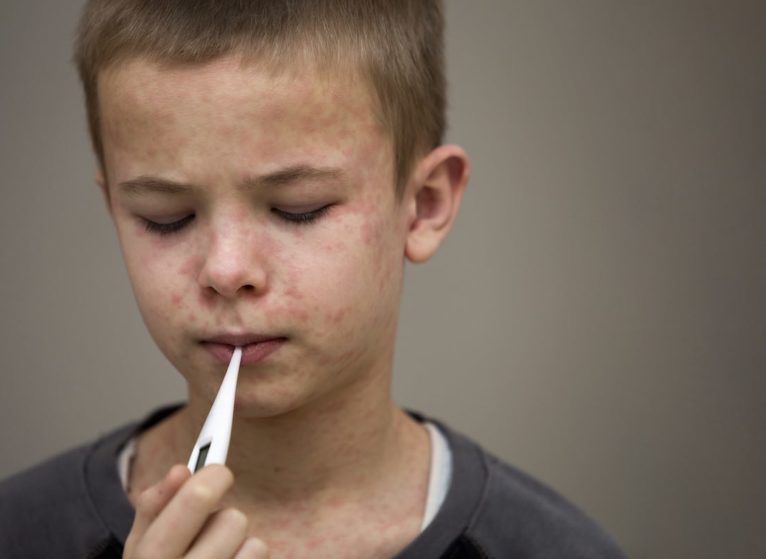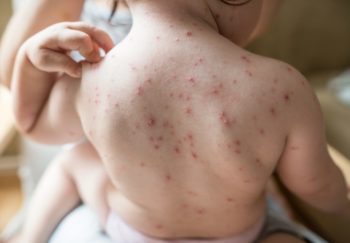One day, 7-year-old Olivia seemed to be recovering. She was alert and playing in bed. But 12 hours later, she was gone. The cause of her death: measles enchaphalitis or swelling of the brain.
This is how author Roald Dahl, who wrote childhood favorites like "Charlie and the Chocolate Factory," described his daughter’s illness. He wrote the essay in 1988 — 24 years after Olivia's death — to remind people in the U.S. about the importance of vaccination. Americans today could benefit from the same reminder.
Infectious diseases like measles, polio, and many others have been out of sight and out of mind for many Americans for decades. Why? High vaccination rates. But that’s changing. And here’s the fallout.
- Our first case of polio in the U.S. since 2013
- More than 20 measles infections here in Virginia, part of a nationwide surge to 1,249 in 2019 — the highest number of cases in the U.S. since 1992
It’s time for a wakeup call, says UVA Children's pediatrician Emily Wong, MD. These viruses are a real threat. Vaccines, on the other hand, prove to be best for your child’s health.
Not Vaccinating Is a Dangerous Choice
An outbreak of a preventable disease like measles is a clear sign that many parents are not vaccinating their kids, Wong says.
A recent 1% drop in the childhood vaccination rate may not seem like a big dip. But that means thousands of kindergarteners left unprotected.
“These viruses are still out there. If enough parents make the choice not to vaccinate their kids, then the viruses can spread more easily,” she says.
She adds, “Because we’ve been successful immunizing against these viruses in the past, many people are not familiar with these diseases. They don’t realize how serious the illnesses can be. They see immunization as a preference rather than a decision based on what is scientifically proven to be best for a child’s health. Reminding parents of the risks can help reinforce the dangers of not vaccinating kids.”
“Because we’ve been successful immunizing against these viruses in the past, many people are not familiar with these diseases. They don’t realize how serious the illnesses can be.”
Emily Wong, MD, UVA HEALTH CHILDREN'S PEDIATRICIAN
Why Herd Immunity Matters to You
Herd immunity is a buzzword we heard a lot during COVID-19. But it applies to other viruses as well. To understand the concept, you have to know how viruses spread.
For an infectious organism to survive, it has to pass from one host to the next. People who are vaccinated have immunity — they make awful hosts. So if a majority of people are immune, then a virus has fewer places to hide out and replicate.
Herd immunity is what you might call a “sweet spot.” It’s the point when enough people are protected against the virus to stop its spread. For a highly infectious disease like measles, that sweet spot is around a 95% immunity rate.
Some kids have allergies or other medical reasons that prevent them from being vaccinated. More parents choosing not to vaccinate tips the scale. It puts us at risk of not reaching the sweet spot to keep viruses in check.
Disturbing Trend: More Parents Not Vaccinating Kids Since COVID’s Arrival
Vaccine refusal is nothing new. Parents in Virginia can get vaccination exemptions for kids because of medical or religious reasons. But with the arrival of COVID-19, some parents found a host of new barriers and concerns. There are 2 big things that have kept them from vaccinating their kids.
Limited Access to Routine Care
Early on during the pandemic, restrictions kept us from visiting the doctor for non-emergencies. So kids scheduled for well checkups didn’t receive routine care, including immunizations. Now 2-1/2 years later, some kids are still missing out on the vaccines they need.
Is Your Child Behind on Shots?
Talk to a pediatrician about the best way to catch up on vaccinations.
Explosion of Misinformation
The pandemic put the topic of disease prevention front and center. But unfortunately, not everyone got accurate information. Some people questioned the safety of the COVID-19 vaccines. That doubt tainted their trust in all vaccines.
“There’s been an explosion of media coverage and a lot of misinformation out there online that is causing a lot of parents to be fearful or suspicious of vaccines — not just COVID vaccines, but all vaccines,” says Wong. “You have to be careful where you’re getting information.”
Wong recommends parents turn to trusted sources if they have any questions about vaccine safety. The American Academy of Pediatrics is a great source. “The primary mission of this organization is to ensure the health and welfare of kids,” she says.
Vaccination Protects Our Loved Ones
Vaccination is the best way to prevent the spread of potentially fatal diseases. The risk of serious complications from many of these viruses may be minimal if your child is healthy. But it’s important to remember — you’re not just vaccinating for your own child’s protection.
You’re vaccinating to help ensure the safety of:
- Your elderly grandmother
- Your sister’s new baby
- Your neighbor who has cancer
The U.S. Centers for Disease Control and Prevention urges parents to catch up on routine vaccines as kids head back to school. Find out which vaccines your child needs and when.


